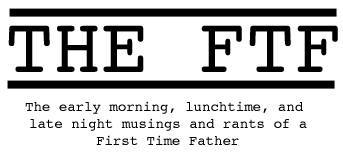As you embark on your career as a parent, there are some snippets of wisdom you’ll hear so often that they sound like clichés. Most of them are true:
- Let sleeping babies lie. (You never know when you’ll get them to sleep again.)
- Don’t buy too many toys; your kid can make a toy out of anything. (The FTS, if we don't stop him, is happy to play with garbage. It's true.)
- Don’t let your two-year-old drive your car. (Okay, we haven’t actually done this, but even so, it’s good advice.)
Barney the purple dinosaur sucks.
Now, I’m not dumb. I get it. All you have to do is watch an episode or two of Barney to get it:
- Barney’s voice characterization is annoying. It’s super-di-dupery annoying.

- The children with whom Barney consorts are always singing badly written songs and dancing badly choreographed routines, and they’re doing so while wearing ear-to-ear vaudevillian grins and playing directly and awkwardly to an unseen audience.
- The actors who play the children with whom Barney consorts can’t really dance, sing, or act.
- The three kid dinosaur characters — B.J., Baby Bop, and Riff — don footwear and headgear and nothing else. If B.J. isn’t going to wear a shirt and pants, does he really need sneakers and a baseball cap?
- One of the kid dinosaur characters is, in fact, named B.J. I can only guess that stands for Barney Junior (I shudder to think of the alternative), but there’s never been any indication that Barney is his or Baby Bop’s (B.J.’s sister) father. What exactly is the message here?
- Barney is kind of phallic looking.
- If Barney really is, as the intro song says, a “dinosaur of our imagination,” would he really be teaching the children (who seem to live in that park) educational and moral lessons? Wouldn’t a child imagine a dinosaur that would A) be 70, not seven feet tall, B) eat people and stuff, or C) fly and shoot lasers from its eyes (like Mothra)?
But those are the things that I see when I watch Barney & Friends. The FTS sees something entirely different:
- A giant, purple, friendly dino-man who teaches him about colors, letters, and sharing.
- A friend that is always happy.
- And a friend that, as the song that closes each episode says, loves him.
It’s this last notion – no negativity – that is the biggest knock against Barney. Parents have complained for years that the show doesn’t help kids deal with negative emotions. Really? I can’t find 30 minutes a day to let my two-year-old forget about negative emotions? Have we become so fracking cynical that we feel a need to saddle our toddlers with our adult baggage every waking minute of the day? What exactly is wrong with being happy for a little while?
To the FTS, Barney is a good friend and a good teacher, and he makes the FTS feel good about himself and about the world.
So how do we reconcile the difference between what our children see and what we see when we watch Barney & Friends? How about this:
Barney isn’t made for adults. Get over it!
It’s a happy 30 minutes, aimed at toddlers and brought to us by the good folks at the Public Broadcasting System. It has a wonderful and long-lasting impact on our children, and I for one applaud the big galoot.
I leave you with this:




1 comment:
Dear God -- that purple abomination has brainwashed you!
Post a Comment